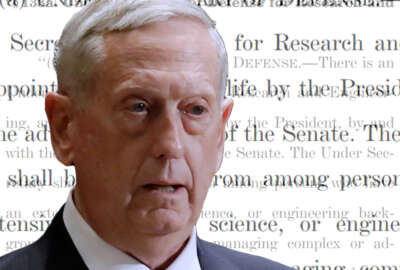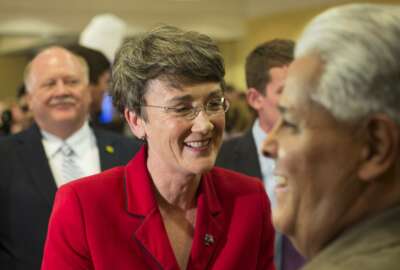
Air Force nominee defends past work for Energy labs, says Air Force is too small to meet its missions
Senators grilled President Donald Trump’s nominee for Secretary of the Air Force on Thursday over $450,000 in alleged improper payments her private consulting...
Senators grilled President Donald Trump’s nominee for Secretary of the Air Force on Thursday over $450,000 in alleged improper payments her private consulting firm collected from Energy Department laboratories, but their questions and Heather Wilson’s answers did little to shed additional light on the matter.
The consulting agreement in question dates to seven years ago, but several lawmakers pursued it on the grounds that it was relevant to her role in overseeing acquisition and contracting, one of the primary responsibilities of any military service secretary.
Wilson said Thursday that the deal was made after the president of the Sandia National Laboratory offered her a full-time position. She concluded the job was “not a good fit” for the time commitment she was willing to make, so the two settled instead on a “quarter-time” arrangement in which her sole-proprietorship consulting firm was paid $10,000 for 50 hours of her work each month.
According to the Energy Department’s inspector general, contracting officers at Sandia ran afoul of the Federal Acquisition Regulation (FAR) by not requiring Wilson’s firm to document any of the work she performed or the time she spent on the contracts; in some cases, the invoices her firm submitted said nothing more than “consulting services.”
“The contracting official did not enforce the FAR requirements, but were you aware of the requirement to provide evidence supporting 50 hours of work for $10,000?” asked Sen. Jack Reed (D-R.I.), the ranking Democrat on the Senate Armed Services Committee.
Wilson said only that she lived up to the terms of her contract as written by Sandia, and noted — correctly — that the IG faulted Sandia, not her firm, for any irregularities in the contracting process.
“I did the work. I completed the contract,” she said. “The DoE auditors never even bothered to talk to me. If they had, I probably would have been able to reconstruct what I did.”
Sen. Richard Blumenthal (D-Conn.) was among the senators who sought an acknowledgment from Wilson that the government itself should have done more to require some documentation of the work she performed or the amount of time she spent on the Energy contract.
“I’m asking you, as a potential Secretary of the Air Force, whether you will hold contractors to a higher standard than was evident here,” he said. “It’s a forward-looking question. I’m not asking you to reconstruct what you did, but shouldn’t we expect more from contractors than this kind of blank invoice?”
“The people that I worked with were supervising me. They knew what I did, and they were satisfied enough to offer me a full-time position as the vice president of the laboratory,” Wilson replied. “I complied with the contract, and I will expect anyone who has a contract with the United States Air Force to comply with their contracts as well.”
None of the senators gave any indication that they considered the consulting matter to be a significant barrier to confirming Wilson, a former Air Force officer who later served as a New Mexico congresswoman and is now the president of the South Dakota School of Mines.
But on broader issues of acquisition policy, Sen. John McCain (R-Ariz.), the committee’s chairman, told Wilson that he expects her to help Congress address what he called a “broken” acquisition system, saying that past Pentagon political appointees have shown “nothing but resistance” to his committee’s reform agenda.
“One of the reasons why we have not got enough money is because we’ve wasted it,” he said. “So my strong recommendation to you is that we start firing some people, we start penalizing contractors, we break up the iron triangle of the military-industrial-congressional complex, and I hope that you will devote some energy in that direction.”
For her part, Wilson gave only a few clues as to how she’d approach acquisition matters as secretary, though she did seem to indicate agreement with the Senate’s push to procure weapons systems more quickly, saying she strongly supports rapid prototyping and experimentation initiatives Congress has passed in recent years, and not beginning new acquisition programs with overly aggressive requirements.
“The A-10 was procured in a very tight time frame, the F- 16 was certainly tighter than some of the other aircraft that we’ve built,” she said. “So, you have to say to a program manager, ‘All right, you’re going to be in this assignment for four years, and here’s what we expect you to accomplish. We don’t expect miracles. We don’t want a 15-year program. We want tight turns, and then we will iterate and innovate after that.’ I think that’s generally been more effective at getting capability out the service in a cost-effective way.”
On budget matters, Wilson’s views were also in line with the relatively hawkish views of committee members.
She made clear she supports the immediate repeal of the Budget Control Act, and advocated for more spending on weapons platforms and personnel — fighter pilots in particular.
Latest Defense Stories
“The Air Force is too small for what the nation expects of it,” she said.” The number of airmen has declined but the demand for air and space power has increased. Leaders have testified that less than 50 percent of the conventional Air Force is ready for all of the missions assigned to them, and I have no reason to doubt that estimate. The Air Force is not currently ready to fight against a near-peer competitor, and that should concern all of us.”
As to the current year, she said it’s imperative that Congress do something in the next month to avert the possibility that the military spends the rest of the fiscal year under a continuing resolution.
“And if there is a continuing resolution for this year we will make all of the problems that we’re talking about here so much worse,” Wilson said. “We will have to stop non-combat flying hours in the Air Force, the pilot exodus would increase, the aircraft won’t be going to depots to be maintained, there would likely be a freeze on civilian hiring for the rest of the year. We can’t operate this way. We need to get beyond the Budget Control Act and get back to normal operations.”
Aside from Defense Secretary James Mattis, Wilson is only the second Defense official of the Trump presidency to appear before the Senate Armed Services Committee for confirmation.
The president’s nominee to lead the Army, Vincent Viola, withdrew in early February because of financial entanglements, and about three weeks later Philip B. Bilden, the Navy secretary nominee, withdrew for similar reasons.
Wilson informed the Defense Department’s general counsel last week that she would divest of stocks she holds in companies that do work for the department, including Intel, IBM, Honeywell and Raytheon. She said she would also resign her current position as president of the South Dakota School of Mines & Technology.
The Associated Press contributed to this report
Copyright © 2025 Federal News Network. All rights reserved. This website is not intended for users located within the European Economic Area.
Jared Serbu is deputy editor of Federal News Network and reports on the Defense Department’s contracting, legislative, workforce and IT issues.
Follow @jserbuWFED





